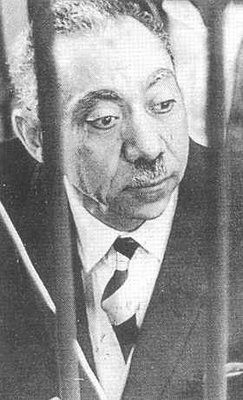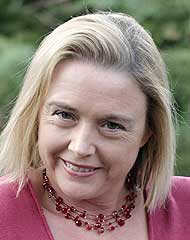Last year I attended a conference in the US about security and intelligence in the so-called war on terror and was astonished to hear one of the more belligerent participants, who as far as I could tell had nothing but contempt for religion, strongly argue that as a purely practical expedient, politicians and the media must stop referring to "Muslim terrorism." It was obvious, he said, that the atrocities had nothing to do with Islam, and to suggest otherwise was not merely inaccurate but dangerously counterproductive.
Rhetoric is a powerful weapon in any conflict. We cannot hope to convert Osama bin Laden from his vicious ideology; our priority must be to stem the flow of young people into organisations such as al-Qaida, instead of alienating them by routinely coupling their religion with immoral violence. Incorrect statements about Islam have convinced too many in the Muslim world that the west is an implacable enemy. Yet, as we found at the conference, it is not easy to find an alternative for referring to this terrorism; however, the attempt can be a salutary exercise that reveals the complexity of what we are up against.
We need a phrase that is more exact than "Islamic terror". These acts may be committed by people who call themselves Muslims, but they violate essential Islamic principles. The Qur'an prohibits aggressive warfare, permits war only in self-defence and insists that the true Islamic values are peace, reconciliation and forgiveness. It also states firmly that there must be no coercion in religious matters, and for centuries Islam had a much better record of religious tolerance than Christianity.
Like the Bible, the Qur'an has its share of aggressive texts, but like all the great religions, its main thrust is towards kindliness and compassion. Islamic law outlaws war against any country in which Muslims are allowed to practice their religion freely, and forbids the use of fire, the destruction of buildings and the killing of innocent civilians in a military campaign. So although Muslims, like Christians or Jews, have all too often failed to live up to their ideals, it is not because of the religion per se.
We rarely, if ever, called the IRA bombings "Catholic" terrorism because we knew enough to realise that this was not essentially a religious campaign. Indeed, like the Irish republican movement, many fundamentalist movements worldwide are simply new forms of nationalism in a highly unorthodox religious guise. This is obviously the case with Zionist fundamentalism in Israel and the fervently patriotic Christian right in the US.
In the Muslim world, too, where the European nationalist ideology has always seemed an alien import, fundamentalisms are often more about a search for social identity and national self-definition than religion. They represent a widespread desire to return to the roots of the culture, before it was invaded and weakened by the colonial powers.
Because it is increasingly recognised that the terrorists in no way represent mainstream Islam, some prefer to call them jihadists, but this is not very satisfactory. Extremists and unscrupulous politicians have purloined the word for their own purposes, but the real meaning of jihad is not "holy war" but "struggle" or "effort." Muslims are commanded to make a massive attempt on all fronts - social, economic, intellectual, ethical and spiritual - to put the will of God into practice.
Sometimes a military effort may be a regrettable necessity in order to defend decent values, but an oft-quoted tradition has the Prophet Muhammad saying after a military victory: "We are coming back from the Lesser Jihad [ie the battle] and returning to the Greater Jihad" - the far more important, difficult and momentous struggle to reform our own society and our own hearts.
Jihad is thus a cherished spiritual value that, for most Muslims, has no connection with violence. Last year, at the University of Kentucky, I met a delightful young man called Jihad; his parents had given him that name in the hope that he would become not a holy warrior, but a truly spiritual man who would make the world a better place. The term jihadi terrorism is likely to be offensive, therefore, and will win no hearts or minds.
At our conference in Washington, many people favoured "Wahhabi terrorism". They pointed out that most of the hijackers on September 11 came from Saudi Arabia, where a peculiarly intolerant form of Islam known as Wahhabism was the state religion. They argued that this description would be popular with those many Muslims who tended to be hostile to the Saudis. I was not happy, however, because even though the narrow, sometimes bigoted vision of Wahhabism makes it a fruitful ground for extremism, the vast majority of Wahhabis do not commit acts of terror.
 Bin Laden was not inspired by Wahhabism but by the writings of the Egyptian ideologue Sayyid Qutb, who was executed by President Nasser in 1966. Almost every fundamentalist movement in Sunni Islam has been strongly influenced by Qutb, so there is a good case for calling the violence that some of his followers commit "Qutbian terrorism." Qutb urged his followers to withdraw from the moral and spiritual barbarism of modern society and fight it to the death.
Bin Laden was not inspired by Wahhabism but by the writings of the Egyptian ideologue Sayyid Qutb, who was executed by President Nasser in 1966. Almost every fundamentalist movement in Sunni Islam has been strongly influenced by Qutb, so there is a good case for calling the violence that some of his followers commit "Qutbian terrorism." Qutb urged his followers to withdraw from the moral and spiritual barbarism of modern society and fight it to the death.Western people should learn more about such thinkers as Qutb, and become aware of the many dramatically different shades of opinion in the Muslim world. There are too many lazy, unexamined assumptions about Islam, which tends to be regarded as an amorphous, monolithic entity. Remarks such as "They hate our freedom" may give some a righteous glow, but they are not useful, because they are rarely accompanied by a rigorous analysis of who exactly "they" are.
The story of Qutb is also instructive as a reminder that militant religiosity is often the product of social, economic and political factors. Qutb was imprisoned for 15 years in one of Nasser's vile concentration camps, where he and thousands of other members of the Muslim Brotherhood were subjected to physical and mental torture. He entered the camp as a moderate, but the prison made him a fundamentalist. Modern secularism, as he had experienced it under Nasser, seemed a great evil and a lethal assault on faith.
Precise intelligence is essential in any conflict. It is important to know who our enemies are, but equally crucial to know who they are not. It is even more vital to avoid turning potential friends into foes. By making the disciplined effort to name our enemies correctly, we will learn more about them, and come one step nearer, perhaps, to solving the seemingly intractable and increasingly perilous problems of our divided world.











